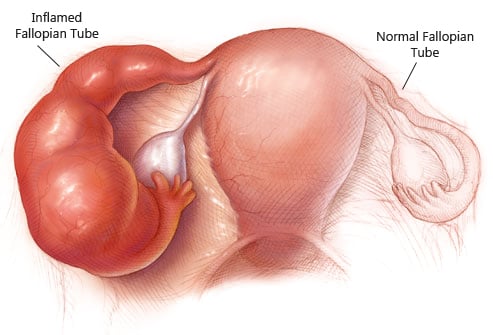Fertility Fact: Of the 750,000 women who experience pelvic inflammatory disease (PID) each year in the United States, it is estimated that 10-15% will have trouble conceiving.
However, with some help, most women with a history of pelvic inflammatory disease can go on to have a healthy pregnancy and delivery.
What is Pelvic Inflammatory Disease?
Pelvic Inflammatory Disease (PID) is an infection of the uterus, fallopian tubes, and other reproductive organs. The infections can cause symptoms such as lower abdominal pain, fever, vaginal discharge, painful intercourse or urination. However, since many of these symptoms are vague and can be contributed to other causes, PID often goes undiagnosed.
Pelvic inflammatory disease occurs in women when bacteria move upward to her reproductive organs from her vagina or cervix. While many different types of bacteria can cause PID, most often it is associated with bacterial sexually transmitted diseases – primarily chlamydia and gonorrhea.
Complications with Pelvic Inflammatory Disease
PID can cause permanent damage to the female reproductive organs and scarring in the fallopian tubes. Scarring in the fallopian tubes can interfere with the egg traveling to the uterus. This can result in the sperm not being able to reach the egg or the egg fertilizing in the tube causing an ectopic pregnancy. As a result of the damage and complications, the risk of infertility continues to increase with the number of episodes. According to Dr. Joseph Doyle, “After one episode of PID, infertility from blocked fallopian tubes will occur in up to 12% of women. After two episodes, it will affect more than one third of women. With three episodes, up to 75% of women will have blocked fallopian tubes.”
Diagnosing and Treating Pelvic Inflammatory Disease
Since the symptoms for PID are often mild and there is no test for PID, a diagnosis for PID is typically based on the clinical findings. Your health care provider may also need to identify the type of organism causing the PID and order a test for chlamydia and/or gonorrhea. An ultrasound might also be used to see if the fallopian tubes show evidence of an infection.
PID is treated with antibiotics; however, the antibiotics will not reverse any damage already occurred, making it important for women to seek care immediately if she is experiencing any symptoms. A woman’s sexual partner(s) should also be treated if a sexually transmitted disease is the cause of infection.
Becoming Pregnant after Pelvic Inflammatory Disease
For women that have had PID and have had damage to their reproductive organs, they will likely have to consult with a fertility specialist to maintain a healthy pregnancy. “The risk of an ectopic pregnancy is increase 6-7 times as a result of pelvic infection,” explains Dr. Doyle. To address this risk and the inability to conceive due to scarring in their fallopian tubes, in vitro fertilizaition (IVF) is often the advised therapy to help achieve pregnancy because with IVF the tubes are bypassed completely.
Annual gynecological exams with STD testing and practicing safe sex is advised to help prevent pelvic inflammatory disease and limit the damage that can be caused by the disease.
If you have had PID and need to consult with a physician in order to achieve pregnancy, please call 1-877-971-7755 or click here to request an appointment.

